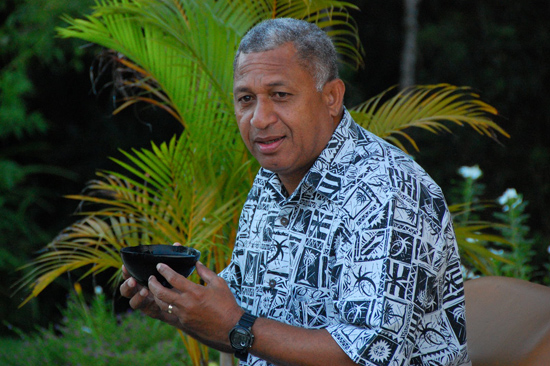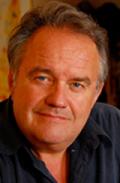
Humiliation faces Australia and New Zealand with the authority that Fiji coup leader Voreqe Bainimarama will now wield as the leader of a virile Melanesian Spearhead Group – backed by the Chinese – that is increasingly regarded as more important than the long-established Pacific Islands Forum. Graham Davis examines Melanesian politics before the MSG begins in Fiji tomorrow.
ANALYSIS: Australia’s impotence in influencing events in its own backyard is being demonstrated in dramatic fashion this week as the Fijian dictator, Voreque “Frank” Bainimarama, fulfils his long-held ambition to assume the chairmanship of the Melanesian Spearhead Group.
All of the other Melanesian leaders – from Papua New Guinea, the Solomons, Vanuatu plus the Kanak FLNKS from New Caledonia – are joining Bainimarama for the MSG summit in Suva on Thursday.
It’s also being attended by official representatives from Indonesia, East Timor and – strangely – the European Grand Duchy of Luxembourg, which has no Pacific interest whatsoever in the normal course of events but is also about to deliver its own slap in the face to Australia. But more on that later.
The humiliation for Australia and New Zealand comes with the authority Bainimarama will now wield as the leader of a virile regional grouping – backed, incidentally, by the Chinese – that’s increasingly regarded as more important than the long-established Pacific Islands Forum, which links the MSG members with Australia, NZ and the smaller island states.
Australia and NZ managed to get Fiji suspended from the Forum two years ago because of Bainimarama’s 2006 coup. But now, the regional “bad guy” gets to be the top guy in the MSG, strutting around as chair of an alternative grouping that’s certainly much more representative of the Pacific’s biggest players and biggest populations – the nearly seven million people in PNG and 850,000 in Fiji.
When Fiji was suspended from the Forum in 2009, Bainimarama mocked the then Forum chair who made the announcement – Toke Talagi, the prime minister of Niue – as a stooge of the Aussies and Kiwis.
Whatever the truth, Talagi represented a population of just 1400 or barely three fully-laden jumbo jets. And those other Pacific leaders who support Australia and NZ’s hardline position on Fiji – notably Samoa’s Tuilaepa Malielegaoi – are also the Pacific’s small guys, however impressive their individual physiques may be.
Derailed summit
Last year, Australia managed to derail Bainimarama’s first attempt to lead the MSG by persuading the then chair, Vanuatu’s former prime minister Edward Natapei, to cancel the Suva summit, where he was scheduled to hand over the leadership to the Fijian leader.
Natapei pulled the thatched mat from under Bainimarama’s feet with a Friday news release that did not reach Suva until the Monday morning of the week the summit was to take place.
Bainimarama cast this as an unforgivable stab in the back from a trusted fellow Melanesian. But he succeeded in turning humiliation into triumph by recasting the MSG summit as an “Engaging with Fiji” summit and attracting every Melanesian leader other than Natapei, most importantly the veteran founding father of Papua New Guinea, Prime Minister Sir Michael Somare.
The Fijian leader was thus able to claim that Australia and NZ had “egg on their faces”. It was no exaggeration.
Since then, Bainimarama has managed to use Fiji’s diplomatic influence and his keen sense of Melanesian politics to first marginalise Natapei and then rely on the Vanuatu leader’s chief political opponent, Sato Kilman, to destroy him.
Much of Kilman’s campaign against Natapei was based on casting him as a man in the thrall of the Aussies and Kiwis who was prepared to betray a Melanesian brother in exchange for more than $60 million in Australian aid.
Whether or not the charge was justified, Melanesian “big man” politics is notoriously unforgiving. Natapei has since been consigned to the electoral dustbin and Kilman thereby removed the one remaining impediment to Frank Bainimarama assuming the leadership of the MSG. Australia and New Zealand – the region’s big boys – lost both the battle and the war.
Another coup
Even members of Australia’s foreign affairs establishment now concede that on top of his 2006 coup, Frank Bainimarama has successfully scored another coup in securing the MSG chair.
Jenny Hayward-Jones is a former Canberra diplomat who is director of arguably the region’s most influential and certainly best-funded think tank – the Myer Foundation Melanesian Program at the Lowy Institute. Once in the front line of the cheer squad urging Australia and NZ to apply the strictest sanctions against Bainimarama, Hayward-Jones appears to have had a dramatic change of heart. Describing the Fijian dictator’s victory in securing the MSG leadership as “a real coup”, she’s now urging an urgent re-evaluation of Australian and NZ policy towards Fiji.
Hayward-Jones has been especially critical of Australian foreign minister and deposed prime minister, Kevin Rudd, who she says is “courting new friends in North Africa” with his campaign for a no-fly zone over Libya while presiding over “an erosion of Australian influence” in the Pacific.
Canberra, she says, has “failed to notice that China’s influence is increasing across the Pacific”, becoming the second largest trading partner in the region after Australia, and that “Australia has a lot of catching up to do if it wants to continue the dominance that it once enjoyed in the region”.
Of course, many others – including this Fiji-born correspondent – have been saying the same thing for some time. The difference is that Hayward-Jones is a Canberra “beltway insider”, and is doubtless speaking for a lot more than just the Lowy Institute in raising her concerns about Kevin Rudd’s priorities.
Official Australian attitudes on how to deal with the Fijian dictator are now split between the hardliners and those like Hayward-Jones who argue the policy isn’t working when Bainimarama winds up heading the MSG and is, in fact, counterproductive in driving him into the arms of the Chinese.
Beijing isn’t just getting a significant strategic and economic foothold in Fiji with the deterioration of Bainimarama’s relationship with Canberra and Wellington. The Chinese are also cultivating the MSG to the extent of funding its secretariat in the Vanuatu capital, Port Vila.
Hayward-Jones is right. These developments present a clear and present danger to Australia’s interests in the region. It certainly seems an extraordinary paradox that while some of its strategic defence planners are urging Australia to arm itself with US nuclear submarines to counter a perceived Chinese threat, Canberra should be so cavalier about its relationship with a budding Chinese satellite like Fiji.
Policy change?
But is there any sign of policy change? Evidently not, judging by the recent comments of Kevin Rudd. During a visit to Wellington at the weekend, the Australian foreign minister was clearly irritated when a TVNZ interlocutor asked him if it was time for both countries to revise their attitude towards Fiji.
Rudd refused to answer the question directly, saying there was often a tendency to focus on what Australian and New Zealand diplomacy should be doing rather than putting the onus on the Bainimarama regime. It was the Fijian leader, he said, who had to change and the trans-Tasman partners would continue to be vigorous in calling for democracy and “were not in the business of legitimising” what had been “a very ugly military coup”.
So what Canberra insiders have long termed the “Rudd block” in achieving any change in current policy towards Fiji continues, whatever the strategic pitfalls.
For his part, Frank Bainimarama simply doesn’t care. The triple Australian-Fiji-NZ citizen he hired as his UN representative, Peter Thomson, has forged a new network of international relationships for Fiji outside the ANZAC orbit, including membership of the Non-Aligned Movement.
This goes a long way to explaining Indonesia’s presence as an observer at this week’s MSG summit, however much it offends Bainimarama’s Melanesian brothers in the Free Papua Movement.
And Thomson has also been a prime influence behind the formation of a formal independent Pacific voting bloc at the UN, which goes a long way to explaining the otherwise inexplicable presence of Luxembourg at the MSG summit.
This tiny European state of just over half a million people has the kind of big aspirations that Frank Bainimarama finds irresistible, way beyond its membership of the European Union, where it could clearly be a crucial ally for Fiji.
UN Security seat
Like Australia, Luxembourg wants a temporary seat on the UN Security Council. And how do you get that? Well, you go lobbying to the four corners of the earth.
So while Kevin Rudd traverses the length and breadth of Africa trying to secure Australia’s seat, a group of suave Europeans from a place famous mostly for being a refuge for funny money have appeared in the South Seas with their strange accents to roger the Aussies in their own backyard.
You can bet they’ll be downing lots of kava and slow-cooked pork on a nod and a wink from the beaming dictator that Fiji’s precious vote will be theirs. It’s a funny old world and Frank Bainimarama is getting the last laugh.
Graham Davis is an independent Fiji-born journalist and commentator. He operates Grubstreet Media and publishes the blog Grubsheet.



